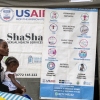Goats and Soda : NPR


A view of a warehouse of Kuehne+Nagel in Geel, Belgium, which homes U.S.-funded contraceptives value almost $10 million. The U.S. State Division has acknowledged that the shares can be despatched to France to be destroyed.
Marta Fiorin/Reuters
conceal caption
toggle caption
Marta Fiorin/Reuters
For months, $9.7 million value of contraception meant for girls in low-income international locations has sat stranded in a Belgian warehouse — apparently destined for destruction — because of the Trump administration’s freeze on international help.
The State Division mentioned in July that it will spend $167,000 in taxpayer cash to incinerate the contraceptives on the finish of the month, even though they’re paid for and unexpired. That drew outrage from humanitarian organizations world wide, who provided to purchase and distribute the productives themselves.
“No one advantages by this product being burned,” Sarah Shaw, affiliate director of advocacy at MSI, advised NPR. “It is an environmental catastrophe, it is a human rights catastrophe, it is only a disaster on each single degree. So it is like, why not simply hand it over quietly, hand it over to a 3rd celebration and allow them to take care of it?”

However the administration’s July deadline got here and went, with out official affirmation of the stockpile’s destruction — creating confusion concerning the standing of the contraceptives and cautious optimism about their survival.
Humanitarians’ hopes have been seemingly dashed final week, when the New York Instances, citing a press release from USAID, reported that the contraceptives had been destroyed. However the subsequent day, it later reported, Belgian authorities entered the warehouse and confirmed the contraceptives have been nonetheless there.
Belgium’s international ministry referred NPR’s inquiries to the Flemish Minister of Surroundings and Agriculture, which has not but responded to questions concerning the standing of the contraceptives. In one other signal of the merchandise’ survival, the Flemish sexual well being group Sensoa is holding a protest “in opposition to the deliberate incineration of contraceptives saved in Geel and the refusal to promote them to Belgium” exterior the American Embassy in Brussels on Thursday.
One nonprofit, PAI, mentioned in a Friday assertion that “we hear one factor from one supply and one other from a special supply,” blaming the U.S. authorities for creating “confusion amongst civil society and most of the people.”
However help teams have welcomed the paradox, hoping there may be nonetheless an opportunity the contraception tablets, implants and injectables — with expiration dates starting from 2027 to 2031 — could make it to their meant recipients.
In line with the Worldwide Deliberate Parenthood Federation (IPPF), 77% of the merchandise have been earmarked for 5 African nations — the Democratic Republic of the Congo (DRC), Kenya, Tanzania, Zambia and Mali — a lot of that are already going through contraceptive shortages in gentle of the Trump administration’s dismantling of USAID.
The destruction of this single stockpile may result in 362,000 unintended pregnancies, 161,000 unplanned births, 110,000 unsafe abortions and 718 preventable maternal deaths, in response to the Reproductive Well being Provides Coalition (RHSC).
Over 70 U.S.-based and worldwide organizations despatched a letter to Secretary of State Marco Rubio on Friday, urging him to scrap the destruction plans and “do all the pieces you may to make sure lifesaving commodities, together with contraception, attain folks in want.”
“Proper now, ladies and ladies world wide are desperately in search of out contraception and going through empty cabinets,” they wrote. “In the meantime, this administration is selecting to spend taxpayer {dollars} to destroy efficient well being and medical provides which can be wished and wanted and that might save and rework lives.”
They added that regardless of the administration’s claims in any other case, the truth that the merchandise haven’t but been destroyed means “it’s not too late to do the best factor.”
NPR despatched two emails to the State Division asking for remark, on Monday and once more on Tuesday morning, however didn’t hear again in time for publication.
The contraceptives can nonetheless save lives
Of their letter to Rubio, the humanitarian teams criticized the U.S. authorities for rejecting “quite a few affords to purchase or ship the provides all whereas spreading deliberate misinformation about contraception.”
They’re notably involved concerning the State Division’s characterization of the contraception merchandise — which stop being pregnant from occurring within the first place — as “abortifacients,” which trigger the termination of a being pregnant. There aren’t any strategies of abortion included within the stockpile, in response to humanitarian teams and a listing checklist obtained by NPR.
“If this contraception is destroyed underneath the blatantly false pretense that they’re abortifacients, it will be an outrageous act of cruelty,” mentioned Beth Schlachter, MSI Reproductive Decisions’ director of U.S. Exterior Relations. “It might value lives, derail progress in international well being, and strip hundreds of thousands of individuals of the essential instruments they should plan their households and shield their well being.”

The U.S. authorities has “many accountable choices obtainable to them” to stop the provides from being destroyed, says Rachel Milkovitch, a world well being coverage specialist with the humanitarian medical help group Médecins Sans Frontières USA, or Docs With out Borders. They might promote them to a number of of the NGOs providing to distribute the merchandise, probably with assist from one other European authorities, and even donate them to African international locations’ ministries of well being instantly.
“There may be $10 million value of product that has already been paid for that might simply be moved out to international locations,” says MSI’s Shaw. “And native well being programs will use this product, it’ll go to good use.”
Shaw says getting the shares — which she described because the equal of ten truckloads — from Belgium to different international locations, notably in Africa, may take as many as six months, contemplating the logistics of transport and customs, plus distribution inside the nation.
And he or she notes that many of those international locations have a coverage the place they’ll solely settle for medicines not less than two-years earlier than their sell-by date — which may elevate questions concerning the contraceptives set to run out in 2027. However Shaw additionally notes that it’s doable — and on this case, possible — that they might safe waivers to get round that rule.
“Given the acute shortages that [health] ministries are experiencing, I think about that they might be very joyful to concern waivers as a result of they know that the product goes to get used,” she added.
The stranded stockpile is simply a part of the issue
The U.S. has lengthy been the biggest bilateral donor to household planning — it contributed $600 million every year, making up nearly half of worldwide donor funding, in response to the RHSC.
However that has modified with the second Trump administration. When the State Division froze international help in January, it particularly halted household planning companies as a result of it didn’t think about them “life-saving” — regardless of huge proof exhibiting that these companies cut back maternal and new child deaths.
That freeze, and the administration’s dismantling of USAID, has left an enormous hole in international household planning sources. Humanitarian teams say that is already inflicting shortages in lots of sub-Saharan African international locations, which the destruction of the $9.7 million stockpile would severely exacerbate.
One group, Worldwide Deliberate Parenthood Federation (IPPF), says that in Kenya — the place unsafe abortions are among the many 5 main causes of maternal deaths — the U.S. funding freeze has left amenities with lower than 5 months’ provide of contraceptives, as a substitute of the required 15 months.

IPPF additionally warned of a scarcity of contraceptives, notably implants, in Tanzania, which has “instantly impacted purchasers’ selections relating to household planning uptake.” It says the merchandise within the now-stranded stockpile symbolize “a terrifying 28% of the whole annual want of the nation.”
Shaw, of MSI, says its groups on the bottom should begin turning ladies away — which shall be “life altering” for these ladies.
“It means ladies are going to drop out of college. Ladies are going to have unsafe abortions. Ladies are going to die in childbirth,” she says. “I imply, that is actually a complete technology of ladies and ladies that the trajectory of their life has been modified in a short time due to this.”
Whereas help teams say the contraceptives being held in Belgium are desperately wanted, in addition they acknowledge that their distribution would not fill within the gaping gap left by the U.S.’ withdrawal from this house.
The group PAI has mentioned there may be an estimated $40 million value of contraceptives held up at varied factors within the international provide chain. One instance, in response to RHSC, is a stockpile value $1.5 million being held in Dubai.
Milkovitch, of MSF-USA, says it is value asking questions on the entire contraceptives which can be held up — whether or not in transit, warehouses or elsewhere — and never simply the $9.7 million inventory in query.
“If we save these provides, if we stop their destruction, it would not form of begin or finish with this,” she says. “There’s nonetheless going to be contraceptive stockouts within the locations that beforehand benefitted from U.S.-supposed household planning and reproductive well being packages.”












